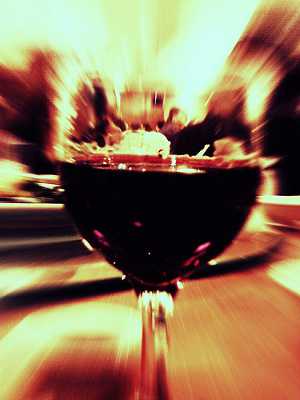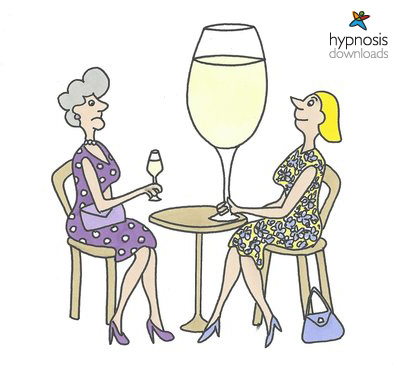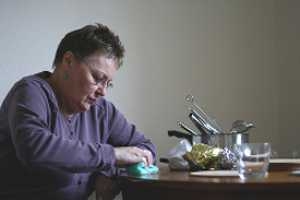How to Stop Drinking Wine Every Day
8 tips to limit wine drinking and stop damaging your health, wealth, and wisdom
 "How much wine is too much?" courtesy of koalazymonkey
"How much wine is too much?" courtesy of koalazymonkeyI've been there myself. Time to crack open a bottle of red/white/rose. It's the end of the day, the evening, time to relax, unwind. Come on! We're all nannied to death, aren't we? The state can't help but interfere in our lives - guidelines and directives about everything. And anyway, we're told red wine is good for us and that gives us carte blanche to swig gallons of the stuff. If a little is good, more must be better - right?
- A bit of exercise is good - overdoing it could make you sick.
- One aspirin may cure your headache - 100 aspirins will not make you 100 times better.
- Some wine may be good for you - too much can kill you.
Stop 'wining'; it's my life!
I'm all for people living their lives how they choose. And I love wine; but, as we all know, more is most definitely not better, not in the long- or even short-term. It's easy to kid ourselves we're not drinking too much wine, to pretend it's harmless.
But millions of people have let an innocent nightly tipple turn into a mortally threatening compulsion. Free will is important and that stretches two ways. Sure, people should choose what they do, but compulsion steals the very freedom of choice we all value so much.
Prefer to watch instead?
So how much wine is too much?
According to most guidelines, one 'drink' is equivalent to:
- 5 ounces of wine.
- 12 ounces of beer.
- 1.5 ounces of 80-proof distilled spirits, such as vodka.
These same guidelines recommend one drink each day for women and two for men. Many people are surprised by this. One woman I know never seems to drink less than two bottles of wine a night. But even just a few glasses a night add up to a significant health risk.
What exactly are the dangers of excessive wine consumption?
Reduce wine drinking to avoid all this
Too much wine too often can:
- Make you fat - alcohol supplies calories with few essential nutrients. What's more, the sugar in alcohol can stimulate appetite, making you want to eat more. Obesity carries its own risks, including heart disease and some cancers.
- Cause chronic liver damage.
- Prematurely age your body (particularly the skin).
- Disrupt the quality (if not the quantity) of your sleep. And impaired sleep brings its own health problems.
- Make you chronically tired and unable to concentrate the next day.
- Make you feel at the mercy of an 'addiction'.
- Disrupt your 'sex hormones', with the possibility of loss of fertility in women and depletion of testosterone in men causing loss of sexual response.
Mm, think I'll just put that wine back in the fridge.
If you feel that your daily wine drinking habit has become or is getting out of control, here are some timely tips to help you reduce your wine drinking:
1) Keep a record
Before you change anything, keep an honest record for a week of all the wine you drink, all the bottles. Be brutally honest with yourself. Head-in-the-sand avoidance is so dangerous when it comes to health. You need to know the situation exactly. At the same time, keep a money record. Add up how much money you've been spending on wine per week, per month, and, by logical extension of this, per year. Know the beast.
2) Don't save up all your drinks for the weekend
It's a curious thing. We all seem to think in terms of banking. If I 'save up' by not drinking too much wine during the week, then I'll 'be in credit' and so be able to drink loads at the weekend. Drinking a lot sometimes is better than drinking lots all the time, but binge drinking is still harmful.
3) Find another wind-down ritual
We like demarcations, ways to delineate between 'then' and 'now', and people have many ways to 'shift gear' from work or day mode to evening time. It's not always the wine itself we become addicted to, but the ritual of shifting gear. And this still needs to happen, albeit in a healthier way.
At the time you'd normally start on the wine - say, six o'clock - take a warm shower instead. Disrupt the pattern. There are lots of ways to wind down that don't make your head fuzzy and your skin tired.
4) Slow down!
Gulping down wine like there's no tomorrow is a sure-fire way to, well, drink more wine. We can drink so fast we forget to taste. People do the same with food and get very fat. You can enjoy one glass of wine and make it last. Savour it, drinking one glass over an entire evening. Set this as a challenge to yourself and learn to do it.
5) Take days off
Drinking too much wine every day is hard work for your body. Start by assigning yourself one day off and get used to not drinking any wine on this day. Once that's a cinch for you, then start adding more wine-free days - but remember Tip 2. Don't 'make up for' this time out by drinking more on other days. The overall effect should be for you to cut back your total weekly amount.
6) Don't keep wine in the house
It's too easy, of course, to quaff the wine when it's readily available. Make a point of not buying bottles in the store when you do your weekly shop. Buy one bottle at a time and take care not to buy more wine for at least three days. Don't make it easy for yourself to overindulge.
7) Don't run to wine at the drop of a hat (or any setback)
- "I had to have a glass of wine after what he said to me!"
- "What a day! Where's the wine?"
- "Someone just asked me if I'm pregnant! I'm not! I need a glass of wine!"
In the course of most days, there are little upsets (sometimes major upsets), but there are better ways to respond than drinking yet more wine. Start practicing dealing with the normal stresses and strains of life by not reaching for the bottle.
8) Mentally prepare to remain wine-free
It's much easier to behave in a certain way if the mind (and body) expect to behave in that way. Strongly envisaging a day of not boozing on wine will make it both easier and seem more natural to remain dry. Close your eyes, relax, and imagine seeing yourself going through the whole day free of wine.
And as no less a personage than Will Shakespeare wrote: "Good wine is a good familiar creature if it be well used."







